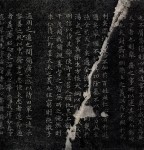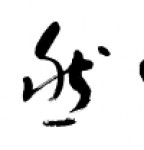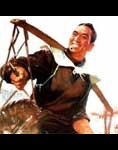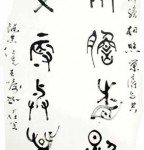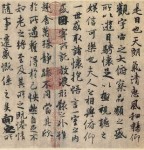| Article Index |
|---|
| Bringing it All Back Home: Chu Teh-Chun at NAMOC |
| 第二页 |
| 第三页 |
| 第四页 |
| 第五页 |
| 第六页 |
| 第七页 |
| 第八页 |
| 第九页 |
| 第十页 |
| 第十一页 |
| 第十二页 |
| 第十三页 |
| 第十四页 |
| 第十五页 |
| All Pages |
Fifty-five years ago this May, yet another aspiring painter arrived in Paris. The French capital was then the mecca for artists from around the world, but 34-year-old Chu Teh-Chun (Zhu Dequn), who is being honored by a major retrospective this month at the National Art Museum of China (NAMOC), had traveled particularly long and far to reach the city of his dreams. His study of art had begun almost 20 years before at the China Academy of Art in Hangzhou, and from the first time he looked inside a book of Western painting he knew Paris was where he wanted to be.
Paris has been his home ever since, and it was there he took a leading role in an artistic story of great significance – that of a small group of Chinese artists who labored in the second half of the 20th century to synthesize Eastern and Western artistic traditions to create something entirely new – a vivid form of “abstract” painting that unites the traditional Chinese feel for the spirit of landscape to Western color and freedom from form.
In Paris Chu at first took the usual paths, creating oil paintings inspired by modern masters like Matisse and then the classics like Rembrandt. But a chance encounter with the lyrical abstracts of Nicholas de Staël (1914-1955) showed Chu the way to what he really wanted to do. “He was looking for a way to move from the figurative to the abstract but he didn’t know how,” says his son Yvon Chu. “Then he saw de Staël.”
From that moment Chu pursued the course that led ultimately to the exhilarating canvases of the late 1980s and beyond, many of which are on display at NAMOC. It was with these works that he felt finally he achieved his aim – to capture a landscape, not in its literal form, but by summoning up in paint the feeling the landscape had inspired in him. His son comments that Chu “always says the difficult thing is to capture that original feeling in the painting,” but in the paintings born out of a visit to the French Alps in the mid ‘80s he achieved just that.

encre 70×55 2008 gift CHU family
These works led him to be celebrated in France and even saw him admitted in 1997 to the hallowed ranks of the Académie des Arts et Lettres, the first painter of Chinese extraction to be so honored.
Unlike others of his generation of Chinese painters like the sublime T’ang Haywen(1927-1991), Chu is not at all a spiritual man. He is simply a painter, first and last, and one who – up until his recent stroke which prevented him from attending this retrospective – has continued to paint every day and to seek new ways to express himself.
In 2007, at the age of 87 he undertook an extraordinary new project, working with the venerable ceramics house of Sèvres to create 57 beautiful hand-painted and multiply-fired vases of which a small selection is a highlight of the NAMOC show.
This thoughtfully curated exhibition is a wonderful insight into the work of this important painter.

encre 46×34 1988 gift CHU family

encre 67.5×45 1982 gift CHU family

encre 68.5×45 1982 gift CHU family
Au bord de la rivière No40 1959 116×81

Burning center2003 200×200
Deep greenery - Diptyque250×500

Green dynamism- Triptyque 195×390
Homage to Nicolas de Stael, 1955

La source le 19 avril
le bon hiver 195×260 DiP

les elements confédérés 162×650 quin
New Brightness – Diptyque 200×600 
No313 260×195cm 1969

No314 DIP 195×260
No 231 195×130

Rouge, 195×130,1960
the end of shade 160×80

To the luminous heart- Quadriptyque 195×456 quadriptique
Vibrating Orchestration
Wintry inspiration – Diptyque, 195×260

朱德群陶瓷作品
朱德群陶瓷作品
朱德群陶瓷作品
朱德群陶瓷作品

画家速写本 Sketchbooks
画家速写本 Sketchbooks
资料照片 Photo-Pwotrait

资料照片 Photo-Pwotrait
资料照片 Photo-Portrait chu 5 by Wolfgang Osterheld
| < Prev |
|---|
- 2010-12-20 - Philosophy About Chinese Calligraphy
- 2010-08-10 - Laozi (Lao-tzu, fl. 6th C. BCE)
- 2010-08-08 - The Dragon's Embrace - China's Soft Power Is a Threat to the West
- 2010-06-04 - Aesthetics & Philosophy About Chinese Calligraphy
- 2010-04-19 - The Core of Chinese Culture












